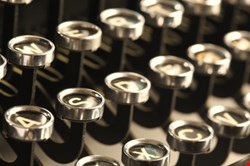

The German government is considering a return to using typewriters for particularly sensitive documents in a bid to evade NSA surveillance, according to reports.
Patrick Sensburg, who is leading a Bundestag enquiry into revelations that the US agency has been spying on the German government, made the remarks in an interview on the Morgenmagazin TV programme.
When asked by the interviewer if lawmakers were considering using typewriters he replied: “As a matter of fact, we have – and not electronic models either”, according to The Guardian.
“Unlike other inquiry committees, we are investigating an ongoing situation. Intelligence activities are still going on, they are happening.”
The politician hails from the same Christian Democrat party as chancellor Angela Merkel, who is said to have been furious at allegations that even her smartphone was tapped by the NSA.
Last week Merkel ordered the CIA’s top man in Berlin to leave the country amid deteriorating relations between the two countries over the affair.
If they decide to revert to old-fashioned typewriters for sensitive documents, the German authorities won’t be alone.
It emerged last year that Russia's Federal Protective Service issued a tender for 20 Triumph Adler typewriters, although there’s no concrete evidence that this was done to enhance security.
The news comes as the UN High Commissioner on Human Rights released a scathing report slamming the alleged mass surveillance activities of the NSA, GCHQ and others.
“There is a clear and pressing need for vigilance in ensuring the compliance of any surveillance policy or practice with international human rights law, including the right to privacy, through the development of effective safeguards against abuses,” it said.
“Steps should be taken to ensure that effective and independent oversight regimes and practices are in place, with attention to the right of victims to an effective remedy.”
Rafael Laguna, CEO of German software company Open-Xchange, argued that there’s a growing disquiet in Germany and further afield about state-sponsored surveillance.
“The shadow of the Stasi looms large and many Germans, including myself, have personally experienced mass surveillance and state intrusion and it’s not a situation that anyone is keen to return to,” he added.
“Trust needs to be restored in communication channels, and currently the only way to ensure this is for governments, businesses and individuals to adopt more secure, encrypted methods for communicating data.”
A number of “NSA proof” encrypted email services have sprung up of late to serve this new market, including Germany’s Tutanota and ProtonMail, developed by a group of former CERN engineers.